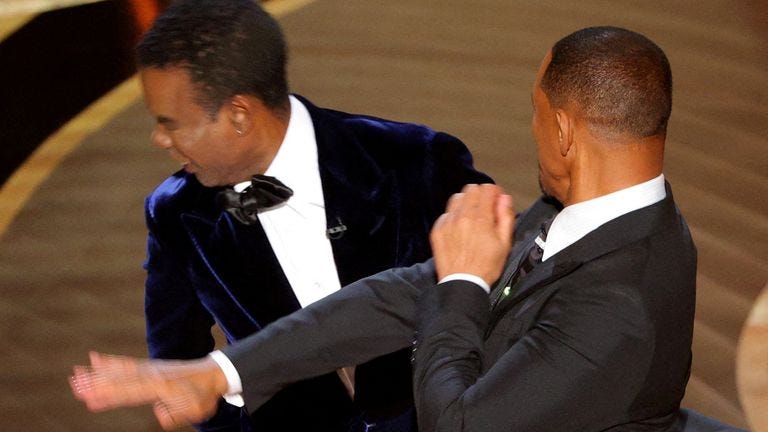A friend posted something about someone from a famous band, throwing stuff out of his hotel room window on tour.
A tactfully-worded note came from the hotel concierge, offering to help with any window difficulties the star might be having. Another harassed hospitality professional trying to balance exasperation with customer service.
Babies throw things because they have no concept of the consequences.
My friend didn’t post it in direct admiration of the trash behaviour, more affection for the guy himself, I think. Plus, the musician died young and isn’t mainly remembered as a disruptive house guest.
The Academy of Motion Picture Arts and Sciences announced this week that they are assembling a specialist “crisis team” to respond to any unexpected behaviour at the 95th Academy Awards at the weekend.
It is in response to the infamous slap, delivered to Chris Rock’s face by Will Smith after Rock made a joke about Smith’s wife at last year’s Oscars.
Babies slap other babies, because they have no concept of the consequences.
And it got me thinking about our culture and the rules for being famous.
Smith got banned from the Oscars for ten years. He was grounded. No assault charges were brought, despite the millions of witnesses.
The rock star I mentioned probably got an eye roll from his management. Par for the course with touring musicians. “What’s he like?” Maybe the record company wrote a cheque.
Fame turns ordinary people into special babies; indulged, provided for, teams of people employed to clean their dirty.
And we’re OK with it.
I once heard a story about a famous man who literally passed responsibility for the drug-rape he’d committed onto a non-famous friend at the same party. He got away with it too, the man in the story. (It’s an uncorroborated story.)
It’s hard to credit a direct link between a person’s status and their freedom to commit crime because it sounds far-fetched. Like something you’d say without being able to back it up. No one’s really above the law.
Except for the people who are.
I’ve been thinking a lot about NDAs and how a legal document designed to prevent industrial espionage is now more often used to clean up the mess after a man of status is sexually inappropriate with someone who works for him.
Some actors use them to hide their use of sex workers. Say, if their image is the wholesome family guy, movie tickets are harder to shift if you can picture him with a satsuma in his mouth.
Some company bosses use them to pay off secretaries they’ve raped and impregnated: a six figure sum to get rid of the baby and keep quiet. Like something out of Mad Men, but now.
We already know less than two percent of reported rapes in the UK actually make it to conviction, so the choice is either to go up against the best lawyers money can buy, where they’ll shred your reputation and cast doubt on everything you know is true, raping you all over again in front of a jury. And then you’ll lose anyway.
Or, take the money and go home.
So they take the money. Mess, cleaned.
Weinstein whistleblower Zelda Perkins has been working with Jess Phillips MP and others to ban the use of NDAs in cases of sexual impropriety. And they’re getting somewhere. If you have a story for them, get involved.


Hiring an actual team of people to watch the Oscars auditorium like hawks, rather than expecting reasonable behaviour from a theatre full of grown-ups is just another leap along the same road.
Given that some celebrities might behave in ways that would get them arrested outside of a film set, we bend the world to fit around their aberrance.
Bill Murray just recently paid a “much younger” production assistant $100,000 to stop talking about how he straddled and kissed her at work. The money makes it go away.
These shitty little power plays that make them feel like superstars should be dying out, confined to history books.
Murray drops a casual hundred K and saunters off to select a putter. Every single person on that movie set was out of a job because of him.
Famously agitprop comedian Mark Thomas recently prevented his ex-wife from talking about his alleged infidelities in a book about their break-up. He couldn’t promise not to sue her, he said.
Maybe he didn’t have the wedge for an NDA, but it did the same job. Her publisher couldn’t take the risk and shelved it.
Not very good for his image, as a defender of free speech and an opponent of censorship. But perhaps better than the world knowing the details of his behaviour with women.
Last year, Channel 4 confirmed it was developing a documentary which would include interviews with Noel Clarke, talking about what it’s like to be “cancelled”. A chance to hear about the story we all read in the Guardian from his perspective.
Clean-ups, cover-ups, on-screen rehabilitation.
What do they give us that is so valuable we have pay them in indulgence?
If your friend was “a bit handsy”, or serially cheated on his wife or touched-up young women at work, you’d probably drop them for being a sleaze. Untrustworthy. Not a nice person.
But we let the powerful get away with it for fear of losing proximity.
An interviewer I admire did a piece, a while back, with a man I have heard terrible things about; stalking, assaults, bullying, worse. Nothing has come to court so he didn’t do it, your honour.
I know he’s paid at least one woman to keep quiet about what he did to her. He’s probably done the same with others. It’s usually a pattern, not a one-off.
That paper trail exists, drawn up in an oak-panelled office somewhere in the city, copies kept on file. Not just gossip and hearsay; bound documents.
In the interview, he comes across as an affable man of the people. Loves his family. Humble to the core. He’s paying people to keep it all going and journalists either don’t know or don’t want to.
I’m repeating myself, but it’s a subject I keep returning to.
The world becomes a giant soft play when you’re famous. No sharp edges.
I’ll still watch the Oscars until I fall asleep on the sofa.
But babies should be in bed.





